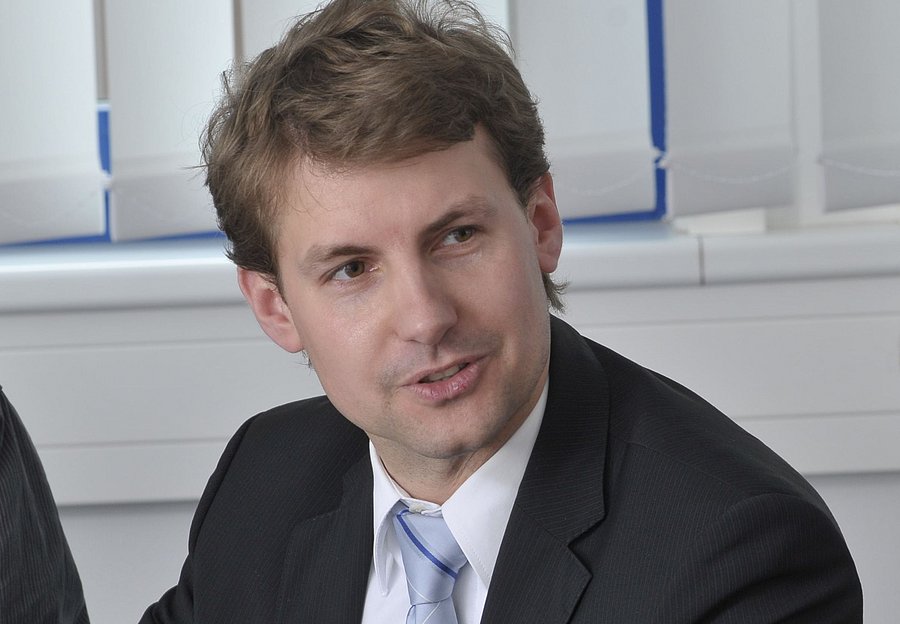
Prof Dr Nils Crasselt / Economics
Business administration - more than just a "toolbox" for companies.
Professor Dr Nils Crasselt and the Chair of Controlling
No, economics was not his dream subject at first. However, Professor Dr Nils Crasselt, who now holds the Chair of Management Accounting in the Faculty of Business Administration and Economics, was able to experience this first-hand.
Due to his excellent knowledge of English - he spent two years of his schooling in the USA - English studies was initially on the shortlist. Perhaps combined with maths, the second subject in his A-levels. But the current university lecturer did not want to become a teacher back then. Instead, he opted for business administration at the Westfälische Wilhelms-Universität Münster. The subject became his vocation during his time as a research assistant at the Chair of International Management Accounting at Ruhr University Bochum. There he completed his doctorate on the subject of "Value-oriented management remuneration, corporate accounting and investment management"; a topic that continues to be exciting, as the current decisions of the VW Supervisory Board on the salaries of the Board of Management show once again. After completing his habilitation project, he took over the Chair of Controlling at the Schumpeter School of Business and Economics at the University of Wuppertal in 2008.
Critical judgement is trained
In his work with students, it is important to the 44-year-old that they not only familiarise themselves with a "toolbox" of business management instruments, but also critically reflect on the risks of using such tools. In addition to the desired effects - for example, the selection of profitable investment projects - undesirable side effects such as an increased willingness to take risks often occur. According to Prof Crasselt, many corporate crises are at least exacerbated, if not caused, by the unconsidered use of business management tools. In order to demonstrate such effects, he involves his students in research experiments. In this way, he and his team have investigated, among other things, how variable profit-sharing based on long-term assessment principles, i.e. offsetting profits and losses from different periods, influences decision-making behaviour and the willingness to take risks. By referring to such research results in their teaching, students receive impulses for training their critical judgement. The dialogue with practitioners from the business world serves the same purpose. Crasselt regularly invites company representatives to give guest lectures so that they can describe real problems from the corporate world and present their approaches to problem solving for discussion. The mixture of theory and practical relevance is well received by the students. The University of Wuppertal thanked him for his commitment back in 2012 by awarding him the Teaching Lion.
Hospital controlling transfer activity
A current research topic of interest for science transfer concerns hospital controlling. Since 2011, Crasselt's chair has been conducting a regular survey study on the status of controlling in German hospitals in cooperation with the German Association for Hospital Controlling (Deutscher Verein für Krankenhauscontrolling e.V.) and the Münster-based management consultancy ZEB.HEALTH CARE. In 2015, the study focussed on the distribution of costs and revenue in hospitals; in 2016, the focus was on benchmarking, i.e. comparing key figures with other hospitals. In this study, he analyses both the existing controlling tools and their further development, for example through increasing digitalisation. Future-oriented topics are also addressed. In issue 15 of the research magazine BUW OUTPUT, Prof. Crasselt emphasises: "New fields of activity for hospital controlling will arise in the future" due to the "introduction of flat-rate fees for the treatment of psychiatric and psychosomatic illnesses"(1), among other things. The results of the study have met with great interest in hospitals throughout Germany, and Crasselt regularly gives presentations at transfer-orientated specialist conferences. Students at the University of Wuppertal also benefit from the study. In the summer semester of 2017, a lecture on hospital controlling will be added to the curriculum, in which the results will once again provide an opportunity for critical discussions with students. After all, the risk of undesirable side effects is particularly high in the area of conflict between economic and medical objectives.
Master's graduates find a job quickly
Prof Crasselt considers the students at the Faculty of Business and Economics to be high-performing. The situation is currently particularly good due to the double Abitur cohort. This is due to the fact that the numerus clausus has been raised as a result of the high demand caused by the switch to G8. And good students also have very good chances of finding a job. Most of the graduates with a Master's degree currently get a job within the first three months. These positive prospects should continue to attract new students to economics in the future and who knows, perhaps they will then find their way to the Chair of Management Accounting. In any case, the Chair also runs its own Facebook page, which has now been liked by almost 2,000 people. Another secret of success.
Uwe Blass (interview from 06/03/2017)
(1) From: BUW OUTPUT, No. 15, page 34
Prof Dr Nils Crasselt studied business administration at the Westfälische Wilhelms-Universität Münster. After graduating with a degree in business administration, he worked as a research assistant at the Chair of International Management Accounting (Prof Dr Bernhard Pellens) at Ruhr University Bochum from 1997 to 2008. He received his doctorate in 2002. Since the beginning of the 2008/09 winter semester, he has held the Chair of Management Accounting at the Schumpeter School of Business and Economics at the University of Wuppertal.
